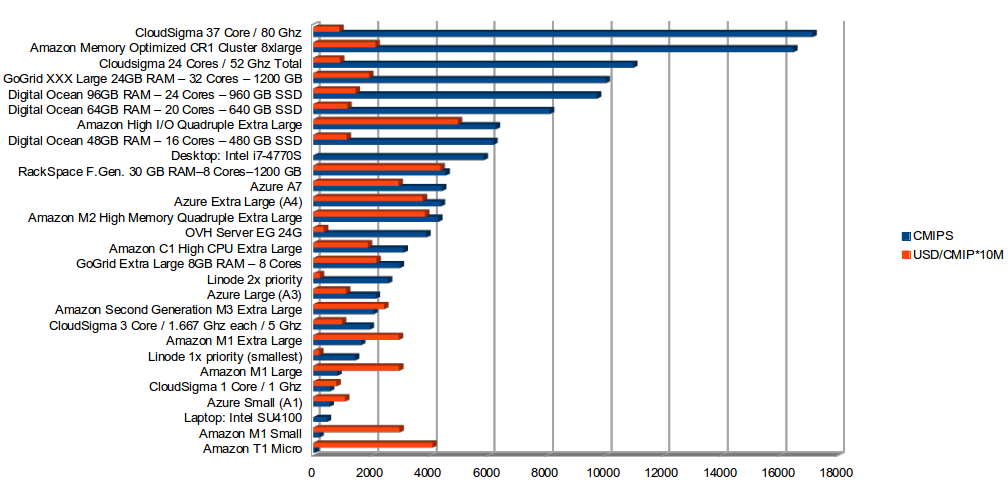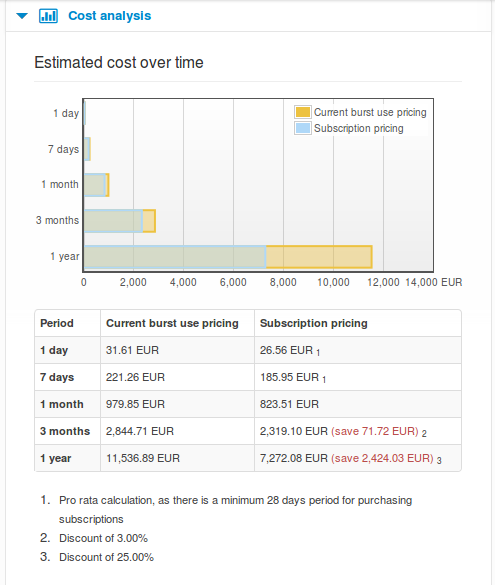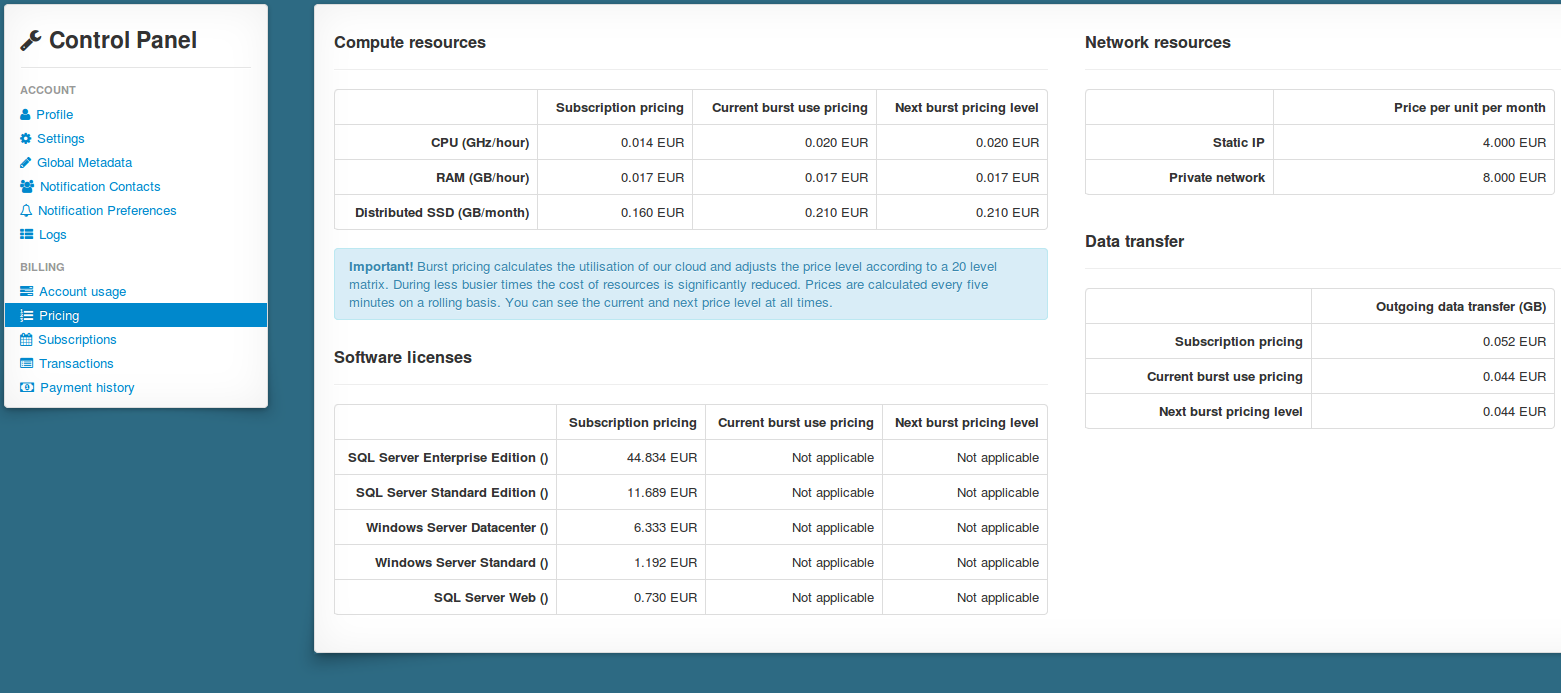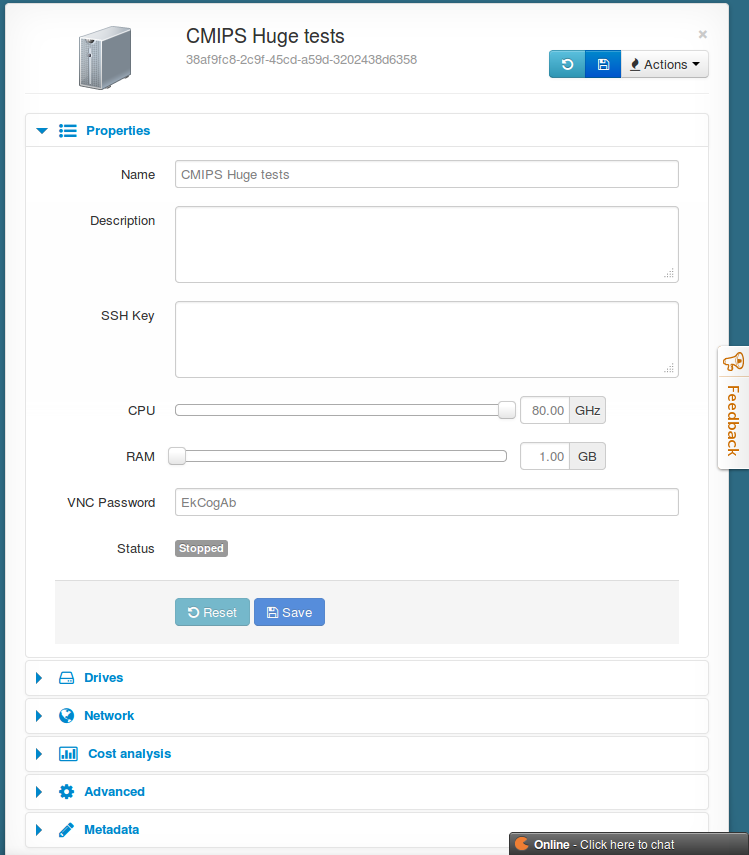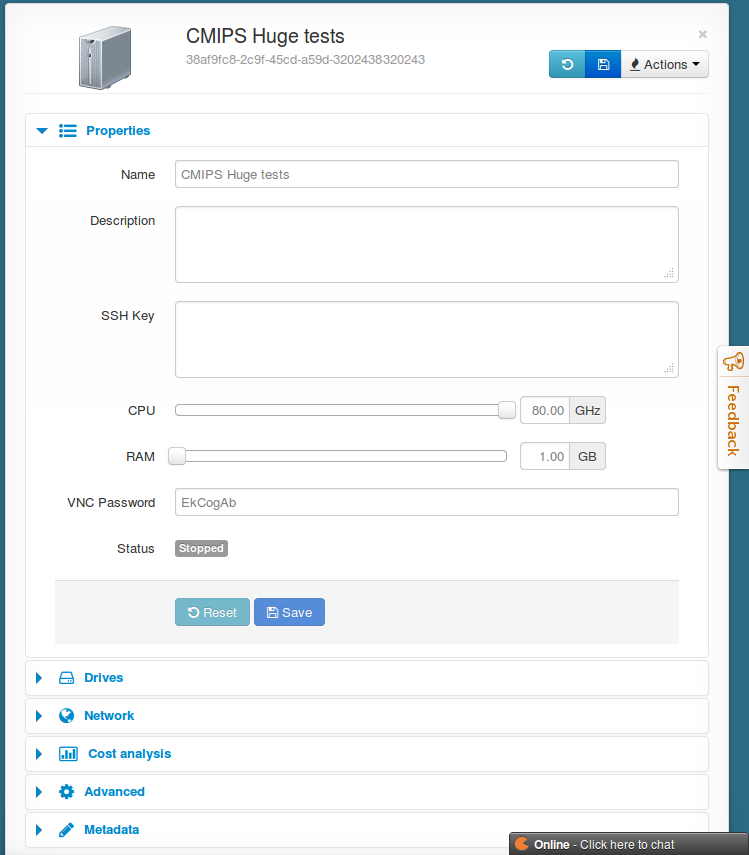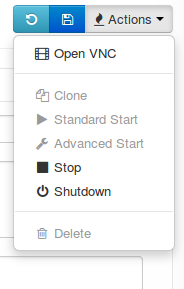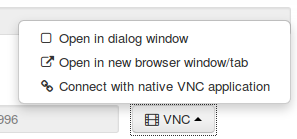Here are provided the CMIPS results after the past tests with Microsoft Azure and CloudSigma Cloud.
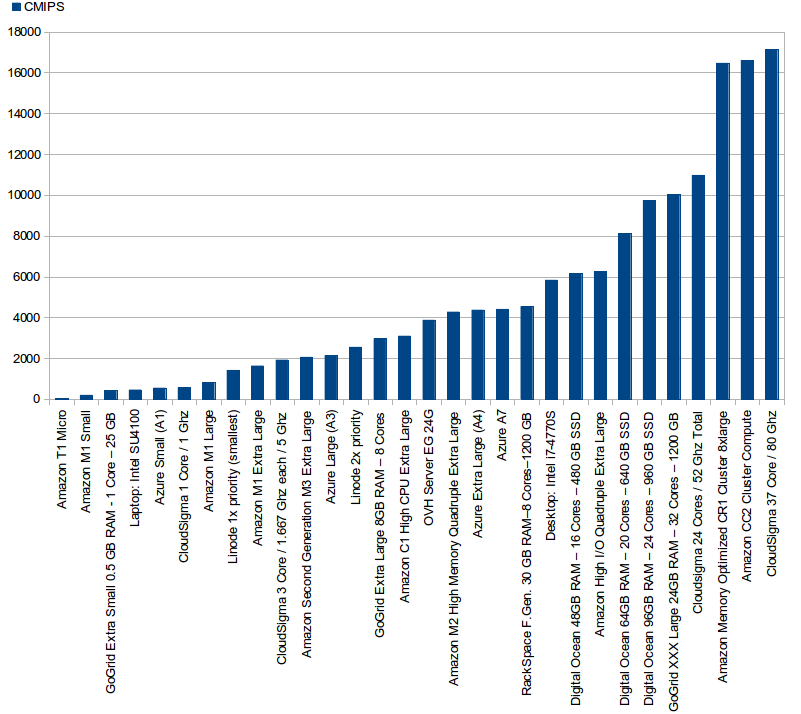 * Please note that values published in the graph for CloudSigma’s CMIPS are the max obtained, as results fluctuated during the tests, as indicated in the review. The range is below, on the html table.
* Please note that values published in the graph for CloudSigma’s CMIPS are the max obtained, as results fluctuated during the tests, as indicated in the review. The range is below, on the html table.
*2 Costs for CloudSigma came in EUR, so have been exchanged from EUR to USD using google. Prices show subscription (not burst mode)
And the CUP (Cost per Unit Process), the orange bar.
Detailed results:
| Type of Service | Provider | Name of the product | Codename | Zone | Processor | Ghz Processor | Cores (from htop) | RAM (GB) | Os tested | CMIPS | Execution time (seconds) | USD /hour | USD /month |
|---|---|---|---|---|---|---|---|---|---|---|---|---|---|
| Cloud | Amazon | T1 Micro | t1.micro | US East | Intel Xeon E5-2650 | 2 | 1 | 0.613 | Ubuntu Server 13.04 64 bits | 49 | 20,036.7 | $0.02 | $14.40 |
| Cloud | Amazon | M1 Small | m1.small | US East | Intel Xeon E5-2650 | 2 | 1 | 1.6 | Ubuntu Server 13.04 64 bits | 203 | 4,909.89 | $0.06 | $43.20 |
| Cloud | GoGrid | Extra Small (512 MB) | Extra Small | US-East-1 | Intel Xeon E5520 | 2.27 | 1 | 0.5 | Ubuntu Server 12.04 64 bits | 441 | 2,265.14 | $0.04 | $18.13 |
| Physical (laptop) | Intel SU4100 | 1.4 | 2 | 4 | Ubuntu Desktop 12.04 64 bits | 460 | 2,170.32 | ||||||
| Cloud | CloudSigma | 1 Core / 1 Ghz | 1 Core / 1 Ghz | Zurich (Europe) | Amd Opteron 6380 | 2.5 Ghz to 3.4 Ghz with Turbo | 1 | 1 | Ubuntu Server 12.04.3 64 bits | 565 to 440 | 1,800 | $0.04475 | $32,22 |
| Cloud | Amazon | M1 Large | m1.large | US East | Intel Xeon E5-2650 | 2 | 2 | 7.5 | Ubuntu 13.04 64 bits | 817 | 1,223.67 | $0.24 | $172.80 |
| Cloud | Linode | 1x priority (smallest) | 1x priority | London | Intel Xeon E5-2670 | 2.6 | 8 | 1 | Ubuntu Server 12.04 64 bits | 1,427 | 700.348 | n/a | $20 |
| Cloud | Amazon | M1 Extra Large | m1.xlarge | US East | Intel Xeon E5-2650 | 2 | 4 | 15 | Ubuntu 13.04 64 bits | 1,635 | 606.6 | $0.48 | $345.60 |
| Cloud | CloudSigma | 3 Core / 1,667 Ghz each / 5 Ghz Total | 3 Core / 1,667 Ghz each / 5 Ghz Total | Zurich (Europe) | Amd Opteron 6380 | 2.5 Ghz to 3.4 Ghz with Turbo | 3 | 1 | Ubuntu Server 13.10 64 bits | 1928 to 1675 | 518.64 | $0.1875 | $135 |
| Cloud | Amazon | M3 Extra Large | m3.xlarge | US East | Intel Xeon E5-2670 | 2.6 | 4 | 15 | Ubuntu 13.04 64 bits | 2,065 | 484.1 | $0.50 | $360 |
| Cloud | Linode | 2x priority | 2x priority | Dallas, Texas, US | Intel Xeon E5-2670 | 2.6 | 2 | Ubuntu Server 12.04 64 bits | 2,556 | 391.19 | n/a | $40 | |
| Cloud | GoGrid | Extra Large (8GB) | Extra Large | US-East-1 | Intel Xeon E5520 | 2.27 | 8 | 8 | Ubuntu Server 12.04 64 bits | 2,965 | 327.226 | $0.64 | $290 |
| Cloud | Amazon | C1 High CPU Extra Large | c1.xlarge | US East | Intel Xeon E5506 | 2.13 | 8 | 7 | Ubuntu Server 13.04 64 bits | 3,101 | 322.39 | $0.58 | $417.60 |
| Dedicated | OVH | Server EG 24G | EG 24G | France | Intel Xeon W3530 | 2.8 | 8 | 24 | Ubuntu Server 13.04 64 bits | 3,881 | 257.01 | n/a | $99 |
| Cloud | Amazon | M2 High Memory Quadruple Extra Large | m2.4xlarge | US East | Intel Xeon E5-2665 | 2.4 | 8 | 68.4 | Ubuntu Server 13.04 64 bits | 4,281 | 233.545 | $1.64 | $1,180.80 |
| Cloud | Rackspace | RackSpace First Generation 30 GB RAM – 8 Cores – 1200 GB | US | Quad-Core AMD Opteron(tm) Processor 2374 HE | 2.2 | 8 | 30 | Ubuntu Server 12.04 64 bits | 4,539 | 220.89 | $1.98 | $1,425.60 | |
| Physical (desktop workstation) | Intel Core i7-4770S | 3.1 (to 3.9 with turbo) | 8 | 32 | Ubuntu Desktop 13.04 64 bits | 5,842 | 171.56 | ||||||
| Cloud | Digital Ocean | Digital Ocean 48GB RAM – 16 Cores – 480 GB SSD | Amsterdam 1 | QEMU Virtual CPU version 1.0 | 16 | 48 | Ubuntu Server 13.04 64 bits | 6,172 | 161.996 | $0.705 | $480 | ||
| Cloud | Amazon | High I/O Quadruple Extra Large | hi1.4xlarge | US East | Intel Xeon E5620 | 2.4 | 16 | 60.5 | Ubuntu Server 13.04 64 bits | 6,263 | 159.65 | $3.1 | $2,232 |
| Cloud | Digital Ocean | Digital Ocean 64GB RAM – 20 Cores – 640 GB SSD | Amsterdam 1 | QEMU Virtual CPU version 1.0 | 20 | 64 | Ubuntu Server 13.04 64 bits | 8,116 | 123.2 | $0.941 | $640 | ||
| Cloud | Digital Ocean | Digital Ocean 96GB RAM – 24 Cores – 960 GB SSD | New York 2 | QEMU Virtual CPU version 1.0 | 24 | 96 | Ubuntu Server 13.04 64 bits | 9,733 | 102.743 | $1.411 | $960 | ||
| Cloud | GoGrid | XXX Large (24GB) | XXX Large | US-East-1 | Intel Xeon X5650 | 2.67 | 32 | 24 | Ubuntu Server 12.04 64 bits | 10,037 | 99.6226 | $1.92 | $870 |
| Cloud | CloudSigma | 24 Core / 52 Ghz Total | 24 Core / 52 Ghz Total | Zurich (Europe) | Amd Opteron 6380 | 2.5 Ghz to 3.4 Ghz with Turbo | 24 | 1 | Ubuntu Server 13.10 64 bits | 10979 to 8530 | 98 | $0.9975 | $718.20 |
| Cloud | Amazon | Memory Optimized CR1 Cluster 8xlarge | cr1.8xlarge | US East | Intel Xeon E5-2670 | 2.6 | 32 | 244 | Ubuntu Server 13.04 64 bits for HVM instances (Cluster) | 16,468 | 60.721 | $3.5 | $2,520 |
| Cloud | Amazon | Compute Optimized CC2 Cluster 8xlarge | cc2.8xlarge | US East | Intel Xeon E5-2670 | 2.6 | 32 | 60.5 | Ubuntu Server 13.04 64 bits for HVM instances (Cluster) | 16,608 | 60.21 | $2.4 | $1,728 |
| Cloud | CloudSigma | 37 Core / 2.16 Ghz each / 80 Ghz Total | 37 Core / 2.16 Ghz each / 80 Ghz Total | Zurich (Europe) | Amd Opteron 6380 | 2.5 Ghz to 3.4 Ghz with Turbo | 37 | 1 | Ubuntu Server 13.10 64 bits | 17136 to 8539 | 58 | $1.5195 | $1,094.10 |
